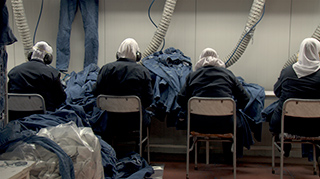The Unstable Object II
- USA / 2022 / No Dialogue / Color / DCP / 204 min
 Director, Script, Editing, Sound: Daniel Eisenberg
Director, Script, Editing, Sound: Daniel Eisenberg
Photography: Ingo Kratisch
Sound: Matthias Rajmann
Source: Daniel Eisenberg
An experimental documentary that painstakingly records through continuous observation the manufacturing processes of three factories—Ottobock, of prosthetic limbs in Duderstadt, Germany; Maison Fabre, of high-end leather gloves in Millau, southern France; and Realkom, of denim jeans in Istanbul and Düzce, Turkey. The film is not only an experiment in visual thinking that keeps its gaze fixed on factories where work is done by hand, but it also invites us into a visual intoxication in its depiction of the endangered practice of manual labor that rejects both narration and explanatory titles, inducing us to examine a future through thinking and analyzing by hand. (AK)
[Director’s Statement] This film extends the issues initially raised in The Unstable Object, 2011, in which three factories were selected that emphatically isolated one of the bodily senses: sight, touch, and hearing. This time, three factories have been selected as well, but the organizing principle is to trace three radically different constructions of mass and individual at the site of production. I’m neither interested in over-determining the experience nor producing a didactic exercise. A return to simpler, non-narrative, non-textual forms expand what might be understood from the image of labor. Preserving relations to time and space, those images retain ontological complexity. They demand analysis and judgment on the part of the viewer. For this project, the work remains simple: find meaningful sites of production, translate experience of them into moving images that somehow convey time, space, social space, and the kinds of attention necessary day in and day out, for those workers who will soon be among the last generations of laborer-producers.
 Daniel Eisenberg
Daniel EisenbergHas worked at the border between documentary and experimental media for over forty years. Has had solo exhibitions at MoMA, Centre Pompidou, Pacific Film Archive, Hirshhorn Museum, American Museum of the Moving Image, Musée du Cinéma, De Unie, and Kino Arsenal, with films shown in the Berlin, Sydney, London, Jerusalem, and New York Film Festivals; and the Whitney Biennial. This film received the Grand Prix and the Prix Georges De Beauregard International at FIDMarseille, and showed at the New York Film Festival, IDFA, DMZ, Beldocs, and FICUNAM. Professor at the Art Institute of Chicago and associate fellow at re:work, International Research Institute, Humboldt University, Berlin.
